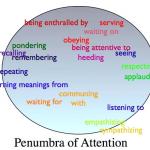Now ready for downloading is the second draft installment of “What is Attention?” the book chapter I began putting out last week. I decided, owing to length, to put it out only as a pdf. (You can also read the first installment, as a pdf, or in this blog.)
It has been five years since the destruction of the World Trade Center in New York with its horrible loss of life. With it, even more shockingly, perhaps, came the disappearance of what had become an essential part of the New York skyline. And what made it all even worse was that it seemed to be an intentional act of suicide terror, by an implacable foe, that had struck from far away. The fact that […]
Today I begin the serialization of the latest draft of my book The Emerging Attention Economy. We start with the first part of Chapter 3; subsequent parts of the chapter will follow at weekly intervals or less. The Preface and Chapter 1 introduce and summarize the book. Chapter 2 is a history explaining how feudalism grew, what it was, and why it gave way to what I call the Market-Money-Industrial system. You can read the […]
This blog focuses on the coming of the Attention Economy. Every so often, I shall remind new readers of what this term means. The basic idea is that we are moving toward a new kind of economy, wildly different from any before. An economy in this sense is system of actions and transactions of some kind involving scarce but desirable or necessary entities, with the multiplicity of such transactions intricately tying an entire society or […]
I would like to find a suitable, general. short pair of words for (a) a person paying attention to (b) a person receiving attention. I have often used the words “fan” and “star” to mean something a bit similar, but not the same. By a fan I mean someone who over time receives less attention than she pays, while a star receives far more attention than she pays. The more general words I am now […]
Earlier this week I spoke to Andreas Weigend’s statistics class at Stanford University. In such a setting, one of the points I wanted to make is that attention is not absolutely quantifiable and never will be. Is my full attention numerically the same as yours? How could we find this out? Is my full attention at one time, equal to that at another, or if less, in what proportion? If I am aware that I […]
“Gestalt” as I am using it simply means the whole complex to which you pay attention or have in mind when you pay attention to a person. For now, let us call this potential recipient of your attention the “target.” (There is always a person or person behind everything except purely “natural” objects, and even natural objects we understand only because of interactions with persons, so that such interactions tend to be integrated even into […]

This is a partial look at the ways Person A can pay attention to Person B. Attention can slide among all these possiblities, even in one particular instance of attention paying. Often, we want pretty much all of this (and perhaps even more) from attention, and if we are skilled and lucky enough in our attention seeking we can sometimes get it all. In future I will explore other aspects of this fludity, and how […]
I gave a talk “The Real Nature of the Emerging Attention Economy: Seen As a New Level in the Massively Multiplayer Game Known as Western Culture, ” at BayCHI* on Tuesday July 11. A version of the keynote presentation– JUST THE “SLIDES,” NO SOUND– with a few added explanations, can now be seen as a pdf . [A quicktime movie is also available (just slides without sound) if you want to see something more like […]
What follows is a long extract from an op-ed by Katha Pollitt in the NY Times of July 12, 2006. It illustrates very well (a) that some people want attention more than money, and (b) how (other) people think about it. (I used to read Pollitt’s columns in “The Nation” regularly, and probably still would, if I could spare the attention. The review to which she refers was also published in the Times, and begins […]